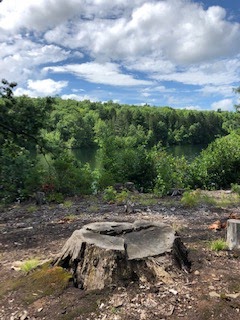In my talks with women throughout the country, I strive to help them understand the merits of solitude and retreat. For it is with solitude that we find the capacity to listen to our own voices, take ownership of our lives and our ideas, and assuage the ache.
But just how does a woman with extra paper taped to the edges of
her calendar find solitude and stillness? There is only one way. She retreats.
She dares to step away from the responsibilities, activities, and routines of
her life in order to embrace the present moment and achieve an inner stillness.
I realized recently that it had been almost 6 months
since I had taken a solo retreat.
And I know that because my last retreat was in the
thick of a hot and humid New England
summer when I spent a day in nature with my bike;
after
which I found this most perfect stump to sit upon in meditation for a good
length of time until I couldn’t stand the mosquitos even one more minute.
And now, fast forward 6 months, I recently found
myself in the thick of an icy and frigid
New England winter during which time I had a series of stressful events that included: my husband’s surgery, my
elderly mother going into the hospital, and both of my children coming down
with pneumonia during the holidays, which all meant I was in desperate
need of a retreat!
I knew I would not be able to do a full-day or
overnight retreat due to low funds and other responsibilities, but I could get
in a half-day.
And in my experience, some retreat is better than no retreat.
In A Weekend to Change Your Life, Ms. Anderson
seems to agree because she writes in her chapter “Courting Retreat- Starting
Small:”
It is valuable to practice retreating in increments by carving
out ritualized spaces of solitude and stillness. You don’t need a full weekend
to experience the benefits of retreating. Start small- begin to find
mini-moments in your day when you can be still and alone…
She then goes on to explain how she began to take
half-day, whole-day and then overnight retreats, and details the profound
impact that these silent retreats
had on her over-all well-being.
One of my original hiding places was the local Catholic church-
the only place in the community that kept its doors unlocked. I would frequent
its dark sanctuary, sit quietly in the back pew, and process my confusion and
pain…
Gradually, I allowed for more time away- traveling out of town
and into nature…These hours away, in silence, graced me with peace of mind, and
I found myself wanting to extend my stays. It quickly became apparent that I
had developed a relationship with solitude- the stillness and silence I
experienced when I spent hours along were more valuable than visits to the
psychiatrists or workshops or lectures on selfhood.
I couldn’t agree more.
And so, in 10 degrees Fahrenheit, I left in the dark, while my family was still sleeping, on a very early
Saturday morning in January, to follow my own intuitive need for silent
retreat, and I headed north to a place I had long wanted to visit: St Joseph Abbey in Spencer,
Massachusetts.For some of you Seekers out there who have an interest in the Christian contemplative traditions, you may recognize the name “St. Joseph Abbey” as the monastery where the Roman Catholic monk Thomas Keating was the abbot from 1961-1981 during which time he conceptualized and heavily wrote about Centering Prayer.
Though I'm not a Catholic or even a Christian for that matter, exploring this path had long been an interest of mine, and after Thomas Keating died in October, 2018 at the age of 95, I had renewed interest to make a pilgrimage of sorts to the monastery where he developed his vision of Centering Prayer as a modern contemplative practice.
The whole retreat, start to finish, didn't take more than 7 hours in total, but the pay-off was well felt for days afterward- actually, I still feel the ripples now, nearly 3 weeks later.
And there is one unexpected moment in particular that I'd like to share, that I haven't yet shared aloud with anyone else just yet.
It happened in the quiet of the great big stone church that is St. Joseph Abbey, when I had decided I wanted to sit and practice Centering Prayer, as I understood it, using these words which have been my companion for the past 6 months or so:
Your will. Just this.
As in meditation, I used these words as both an anchor and a prayer, that I just repeated over and over as the minutes went by.
At this time it was well after the 6:40 a.m. Lauds (which reminded me of Gregorian Chanting) and the 7:07 a.m. Mass (which was a full Catholic service), and I was actually sitting all alone in a pew to the side that is reserved for visitors.
But then a funny thing happened.
I realized, somewhere along the way, my words had changed. I was no longer repeating:
Your will. Just this.
Instead, I was repeating over and over:
Your will. Trust this.
When I realized the transition that had occurred without my conscious awareness, I briefly smiled inward at the sacred beauty of the moment, and then decided to just keep on going with this new set of words:
Your will. Trust this.
I've included below some other photographs of the retreat.
For those of you who have already visited St. Joseph Abbey, you will recognize the spacious monastery grounds and the church with its gorgeous blue stained glass windows.
Perhaps you too can carve out an hour or a day for a retreat of your own in the near future.

















No comments:
Post a Comment